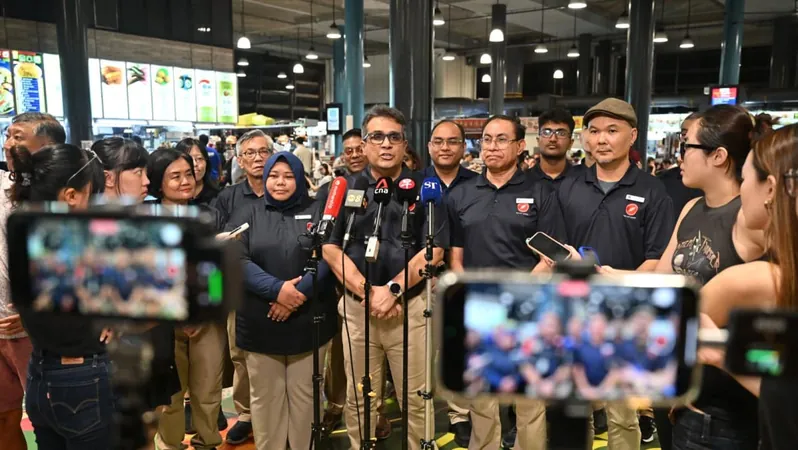
Shock Waves in Singapore's Opposition: RDU Backs Out of Coalition Amid Controversy!
2025-04-12
Author: Mei
In a dramatic turn of events, the Red Dot United (RDU) party has officially withdrawn from The Coalition, raising eyebrows across Singapore’s political landscape. Citing discontent with fellow member National Solidarity Party’s (NSP) plans to dive into a contentious three-cornered contest, RDU’s chairman David Foo expressed deep concerns over the alliance's commitment to maintaining a united front against the ruling People’s Action Party (PAP).
The Coalition, which emerged in 2023 as a unity effort uniting RDU, NSP, Singapore People’s Party (SPP), and Singapore United Party (SUP), aimed to minimize electoral clashes and enhance the opposition's strength. However, tensions have surfaced, particularly due to NSP’s decision to participate in a three-way battle in Sembawang GRC, a move RDU's secretary-general Ravi Philemon described as strategically detrimental.
Philemon argued that allowing multiple parties to contest in the same area would only bolster the PAP's chances, placing the focus on consolidating opposition power instead. "Voters shouldn't have to choose between the right party and a party's right to contest," he stated, emphasizing that RDU supports the Singapore Democratic Party (SDP) as the most viable contender for a direct confrontation with the PAP.
In response, NSP’s secretary-general Spencer Ng defended his party’s decision, declaring NSP as the established opposition in Sembawang and questioning RDU’s assessment of the political landscape. Ng reiterated that NSP was committed to both Sembawang and the ideals of The Coalition, though RDU's withdrawal has left many wondering about the future of the unity initiative.
Despite the fallout, RDU insists it remains dedicated to the notion of opposition unity, with Foo noting that their exit wasn’t taken lightly. He stressed that a primary reason for joining The Coalition was the consensus to avoid multi-cornered fights, a principle the party believes is crucial for providing voters with a clear choice.
As political maneuvering intensifies, RDU has outlined plans to contest in six constituencies, including Jurong East-Bukit Batok GRC and Nee Soon GRC, while indicating potential flexibility to avoid splitting the vote in areas where they believe other parties might have stronger local support.
Conversations between NSP and SDP are ongoing, with both parties discussing potential contesting arrangements. However, the underlying tensions hint at a much-needed reckoning within the opposition ranks as they navigate the complexities of electoral strategy amidst the looming elections.
The stakes couldn't be higher as opposition parties grapple with the need for unity against the formidable PAP, raising questions about whether their collective efforts can withstand internal strife. Will RDU’s exit spark a major shift in the opposition landscape? Only time will tell!



 Brasil (PT)
Brasil (PT)
 Canada (EN)
Canada (EN)
 Chile (ES)
Chile (ES)
 Česko (CS)
Česko (CS)
 대한민국 (KO)
대한민국 (KO)
 España (ES)
España (ES)
 France (FR)
France (FR)
 Hong Kong (EN)
Hong Kong (EN)
 Italia (IT)
Italia (IT)
 日本 (JA)
日本 (JA)
 Magyarország (HU)
Magyarország (HU)
 Norge (NO)
Norge (NO)
 Polska (PL)
Polska (PL)
 Schweiz (DE)
Schweiz (DE)
 Singapore (EN)
Singapore (EN)
 Sverige (SV)
Sverige (SV)
 Suomi (FI)
Suomi (FI)
 Türkiye (TR)
Türkiye (TR)
 الإمارات العربية المتحدة (AR)
الإمارات العربية المتحدة (AR)